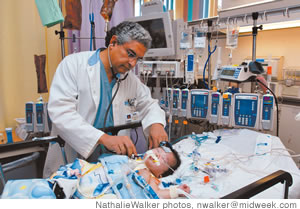Mending Broken Hearts
Interviewed by Melissa Moniz
Wednesday - February 11, 2009
E-mail this story | Print this page | Comments (0) | Archive
 Del.icio.us Share
Del.icio.us Share

Dr. Carlos Moreno
Cardiac Surgeon, Director of Pediatric Cardiac Surgery at Kapiolani Medical Center for Women & Children
Interviewed by Melissa Moniz
Can you describe what a typical work week is like for you?
My week right now at Kapiolani, which has been happening since 1995, is Dr. John Lamberti and I are working together on what we call Cardiac Week. Cardiac Week happens five times a year, and this is the second Cardiac Week for the year. The next one is in June, and then one in August and November. Dr. Lamberti comes over (from San Diego) and stays for an entire week, and we usually see about six to 10 cases of congenital heart surgery. So this is not a typical week for me. But if you call this a week of work, we start on Monday and do two operations each day, except for Thursday, when we only do one because it’s usually a complex one. Then we have a large meeting with administration and different cardiologists, and that wraps up the week. We do probably around a total of 40-50 cases of open-heart surgeries a year during Cardiac Week, and in between I do a number of closed-heart surgeries. That’s another 40-50, so all together we do about 80-90 cases a year at Kapiolani. Some of the more complicated cases do go to San Diego, where Dr. Lamberti practices. He is completely dedicated to pediatrics, so he only does children. I do surgeries in children, but also in adults.
This week is also the Kardiac Kids Valentine’s Party. Can you explain what that is?
There’s an organization called Kardiac Kids that is a support group for families with children with congenital heart defects. Every year they have a reunion that they call a Valentine’s Party, and they hold it in different places. This year it is at the Japanese Cultural Center.
Since you perform cardiac surgeries in both children and adults, can you discuss the differences in conditions that arise?
The pediatric surgeries have more of a variety of operations, and some of them are more challenging. One of the aspects of it is size, because sometimes we are operating on babies who are less than one pound. There are a variety of sizes. In adults, it’s a little more standard, and the most common operation is coronary bypass. In children, the most common operation is for ventricular septale defect, which is a hole in the lower chamber of the heart.
With the children, is it primarily birth defects (congenital)?
Yes, that accounts for more than 95 percent of all the children’s operations. A few are what is called acquired, which is mostly due to an inflammatory disease, but they are not that common.

|
Because a lot are congenital, does that mean the surgeries you perform are usually done on infants?
The problems are usually diagnosed within the first few weeks, and depending on the location and the amount of problems that the defect is causing, will determine if we will fix it early or if we can wait. Sometimes we can wait a few years.
Are there things a pregnant mother can do to prevent heart defects in her baby?
Certainly avoiding smoking and drinking alcohol during pregnancy is important. And, if they are on certain medications, they need to disclose that with the doctor to see if it’s safe to continue taking those medications to avoid the baby developing abnormalities. But in general, most are not preventable and just happen.
You mentioned open-heart surgeries and closed-heart surgeries. Can you discuss the differences?
The main difference between the two is if you need a heart-lung machine to do the operation. It doesn’t mean that you open the heart, but that you need to make connections for the arteries to use the heart-lung machine to support circulation for a period of time. That is what open-heart operations are. Closed-heart surgery is something that you don’t need to stop the heart or connect the baby or child to the heart-lung machine.
For the children who receive surgery, are most corrected or do they still have problems even after receiving surgery?
A majority of them are correctable, and once they have surgery, it’s a lifetime fix. And then a smaller number have conditions where they require several operations over a period of several years. And then there is a small number of defects that are almost impossible to correct.
What are the biggest changes in the field since you started?
One of the things in pediatric cardiac surgery is that it has evolved from operating on much larger children to operating on smaller and smaller children. And at some institutions, they are even doing some intervention in the fetus, so before birth. We are not doing that here, but that is available at certain places. So that is one of the aspects of change. The other thing is technological - the machinery is more precise. So it’s a continuous change. We’re doing more complex and earlier surgeries than we did in the past.
E-mail this story | Print this page | Comments (0) | Archive
Most Recent Comment(s):













